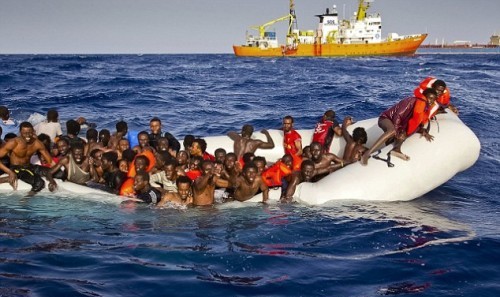European Union(EU) leaders agreed on Friday to curb illegal migration from African countries with the aim of replicating their success to halt inflows from Turkey over the past year.
While migrants reaching Greece from Turkey have dropped to a trickle after a deal with Ankara in March, arrivals in Italy from Africa are increasing so far in 2016.
“Italy received 154,000 migrants in 2015 and 2016 figure is likely to be higher; on Thursday more than 1,400 boat migrants were rescued off the coast of Libya,” Italy’s coastguard said.
To curb flows along the so-called central Mediterranean route, where thousands of migrants drown every year as they make the dangerous journey, the EU is offering trade deals and investment to African countries.
“It is not just about money, it is about substantially improving the capabilities and the chances of people in these African countries and to give hope,” German Chancellor Angela Merkel said on her arrival to the EU summit in Brussels.
In exchange for financial support EU leaders require their African partners to impose tighter border controls and to take back illegal migrants.
“More efforts are needed to stem the flows of irregular migrants, in particular from Africa, and to improve return rates,” said the joint statement on migration, agreed by EU leaders.
Leaders gave their backing to plans devised by the EU Foreign Affairs, Federica Mogherini, to initially use the new approach with five African countries: Niger, Nigeria, Mali, Senegal and Ethiopia.
“First results of these plans will be presented by Mogherini at next EU summit in December, with a view to extend the approach to other countries,” the report said.
Eritrea, often described as Africa’s North Korea for its reclusive regime and poor record on human rights, is another African country that may be considered by the European Union.
Eritrean migrants are among the most likely to be granted asylum in the EU because of the situation in their country.
Italian diplomats welcomed the new focus on Africa, which mirrors Rome’s earlier proposals to tackle the root causes of migration.
A reference in the joint text to the “significant” financial efforts made by Italy in dealing with migrants was also seen as a success by Italy’s Prime Minister Matteo Renzi, who however warned that now actions have to follow words.
Renzi is in talks with the European Commission over its expansionary budget for next year, which may breach EU fiscal rules also for migration spending, which is much higher than Brussels, seems ready to accept.
While planning increased controls at Europe’s external borders, EU countries are also discussing plans to fully dismantle temporary border controls that were introduced among European states during the migration crisis in 2015, when more than one million migrants reached the continent.
But the compromise text was watered down from an initial version that promised to progressively get back to a fully border-free area, known as Schengen.
Copyright Ships & Ports Ltd. Permission to use quotations from this article is granted subject to appropriate credit given to www.shipsandports.com.ng as the source.

